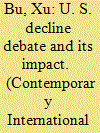| Srl | Item |
| 1 |
ID:
135979


|
|
|
|
|
| Summary/Abstract |
This paper focuses on a conventional debate regarding whether Chinese outward direct investors tend to invest in countries with high political risk. Using 2003–2011 data from the World Bank, the Heritage Foundation and the KOF Swiss Economic Institute, we investigate China's political risk distribution and political risk index (PRI). Our results indicate that China's political risk index was ranked 48th among 153 economies in 2011, in the lower risk level of the PRI spectrum. In an international comparison of political risk distribution, the proportion of Chinese outward direct investment (ODI) among countries with high political risk is less than the world average. The Chinese ODI political risk index has significantly improved and remains lower than the world average. To improve Chinese ODI PRI, the Chinese Government should continue to implement differentiation strategies and to offer official development assistance to improve the investment environment in developing countries and reduce political risk.
|
|
|
|
|
|
|
|
|
|
|
|
|
|
|
|
| 2 |
ID:
134491


|
|
|
|
|
| Summary/Abstract |
What can the scholarship on global international organizations (IOs) tell us about the contributions of the executive head (EH) to organizational change? The empirics of IO studies frequently credit EHs with important changes, but these studies seldom consider EHs separate from the rest of the bureaucracy and thus make few theoretical claims about them. Consequently, it is difficult to assess whether this credit is warranted and why some heads are given more credit than others. This article argues that heads, such as World Bank President Robert McNamara and United Nations Secretary-General Dag Hammarskjold, were influential because they did not just channel state and bureaucratic demands but made political choices that contributed to organizational adaptation. To make this argument, it draws on sociological institutionalist and constructivist scholarship on IO and leadership to develop an analytical framework where IO adaptation is linked to the EH's performance of two tasks commonly associated with executive leadership: defining a strategic plan and mobilizing support to implement that plan. However, it adds that when environmental constraints are severe, the conventional “follower-oriented” mobilization strategies found in leadership studies are less viable. Instead, EHs can adopt an “opposition-oriented” one intended to prevent the opposition from mobilizing while incrementally implementing key reforms.
|
|
|
|
|
|
|
|
|
|
|
|
|
|
|
|
| 3 |
ID:
135286


|
|
|
|
|
| Summary/Abstract |
With China increasing its financing of Africa's development, roles have shifted and new roles are being assigned. The World Bank, having been for many years a prime and essentially unchallenged financier of Africa's development, is under pressure to reconsider its policies vis-à-vis African members. Two Chinese banks have been highly instrumental in this trend—the China Development Bank and the Export-Import Bank of China. According to various estimates, over the past few years these two banks combined have lent more money to developing countries than the World Bank. This article explores in a comparative fashion a range of features of the World Bank and Chinese policy banks' practices in Africa. It argues that, even though such a comparison is methodologically problematic, the current dynamic is going to affect the norms of governance represented by the World Bank and its lending policies toward Africa.
|
|
|
|
|
|
|
|
|
|
|
|
|
|
|
|
| 4 |
ID:
136331


|
|
|
|
|
| Summary/Abstract |
The possibility that the U.S. is in decline has renewed concerns over the international strategic situation and the global order. The World Bank’s International Comparison Program (ICP) released data in April 2014 that suggested China’s economy could overtake that of the U.S. as soon as the end of this year (based on purchasing power parity or PPP which takes into account the relative costs of goods and services and inflation rates). Their figures showed that the size of China’s economy was 87% of the U.S.’in 2011—that is 15% bigger than previously estimated. China’s economy is thought to have grown roughly 24% since 2011, while the U.S. economy is expected to have grown less than 8% .2 The possibility that the U.S. economy is in decline has worried both the public and scholars, and has sparked a new round of lively debate on the future of the international strategic situation
|
|
|
|
|
|
|
|
|
|
|
|
|
|
|
|